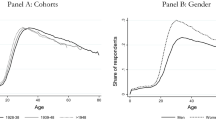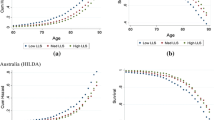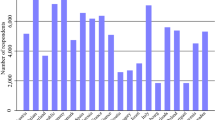Abstract
As they move into and through the retirement years women’s advantage over men in happiness is reversed. Although the happiness of both sexes is affected similarly by retirement from work, marital disruption, and changes in income and health, the difference between men and women in the life cycle occurrence of retirement and widowhood results in different trends in happiness. Men who survive to older age benefit disproportionately from the positive effect on happiness of retirement, while women suffer disproportionately from the adverse effect of widowhood. For women and men in the same work and marital circumstances, women continue to be happier than men. In the future, the turnaround in the relative happiness of women and men in later life is likely to continue, but the shift will be somewhat smaller in magnitude.
Access this chapter
Tax calculation will be finalised at checkout
Purchases are for personal use only
Preview
Unable to display preview. Download preview PDF.
Similar content being viewed by others
References
Argyle, M. (1987). The psychology of happiness. London: Routledge.
Blanchflower, D. G. and Oswald, A.J. (2001, October). Well-being over time in Britain and the USA. Unpublished manuscript. Warwick: Warwick University.
Di Tella, R., MacCulloch, R. J., and Oswald, A. J. (2001, March). Preferences over inflation and unemployment: evidence from surveys of happiness. American Economic Review, 91(1), 335–341.
Easterlin, R. A. (2001, July). Income and happiness: towards a unified theory. The Economic Journal, 111(473), 465–484.
Easterlin, R. A. and Schaeffer, C. M. (1999). Income and subjective well-being over the life cycle. In C. D. Ryff and V. W. Marshall (eds.), The self and society in aging processes (pp. 279–302). New York: Springer.
Frey, B. S. and Stutzer, A. (1999). Measuring preferences by subjective well-being. Journal of Institutional and Theoretical Economics, 155, 1–24.
Gallie, D. and Russell, H. (1998). Unemployment and life satisfaction: A cross-cultural comparison. Archives Europeennes de Sociologie, XXXIX(2), 248–280.
George, L. K. (1992). Economic status and subjective well-being: a review of the literature and an agenda for future research. In N. E. Cutter, D. W. Grigg, and M. P. Lawton (eds.), Aging, money, and life satisfaction: aspects of financial gerontology. New York: Springer Publishing Co.
Michalos, A. C., Zumbo, B. D., and Hubley, A. (2000). Health and the quality of life. Social Indicators Research, 51, 245–286.
Mrozek, D. K. and Kolarz, C. M. (1998). The effect of age on positive and negative affect: A developmental perspective on happiness. Journal of Personality and Social Psychology 75(5), 1333–1349.
National Opinion Research Center (1999). General social surveys, 1972–1998: Cumulative codebook. Chicago: National Opinion Research Center.
Nolen-Hoeksema, S. and Rusting, C. L. (1999). Gender differences in well-being. In D. Kahneman, E. Diener, and N. Schwarz (eds.), Well-being: the foundations of hedonic psychology (pp. 330–350). New York: Russell Sage Foundation.
Oswald, A. J. (1997, November). Happiness and economic performance. Economic Journal, 107(445), 1815–1831.
Wortman, C. B., Silver, R. C., and Kessler, R. C. (1993). The meaning of loss and adjustment to bereavement. In M. S. Stroebe, W. Stroebe, and R. O. Hansson (eds.), Handbook of bereavement: Theory, research, and intervention (pp. 349–366). New York: Cambridge University Press.
Editor information
Editors and Affiliations
Rights and permissions
Copyright information
© 2003 Springer Science+Business Media Dordrecht
About this chapter
Cite this chapter
Easterlin, R.A. (2003). Happiness of Women and Men in Later Life: Nature, Determinants, and Prospects. In: Sirgy, M.J., Rahtz, D., Samli, A.C. (eds) Advances in Quality-of-Life Theory and Research. Social Indicators Research Series, vol 20. Springer, Dordrecht. https://doi.org/10.1007/978-94-017-0387-1_2
Download citation
DOI: https://doi.org/10.1007/978-94-017-0387-1_2
Publisher Name: Springer, Dordrecht
Print ISBN: 978-90-481-6364-9
Online ISBN: 978-94-017-0387-1
eBook Packages: Springer Book Archive




